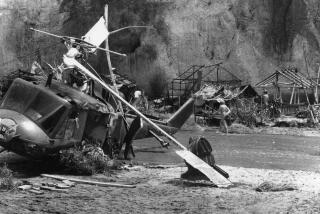The Eternal Fear -- Kids Gone Wild
- Share via
Preachers warning churchgoers away from popular culture must be delighted with the way Michael Jackson’s defense went. Is there anything more likely to turn fence-straddlers into “moral values” voters than the pictures defense witnesses painted of life at Neverland?
Children testifying on Jackson’s behalf say they roamed the halls at all hours, played video games and slipped in and out of Jackson’s bedroom. Jackson’s accusers, meanwhile, were depicted as an unsupervised horde straight out of “Lord of the Flies” -- allegedly swigging wine, stealing money, trashing bedrooms, crashing golf carts, gobbling candy, holding knives to the throats of servants and masturbating in front of other children. You don’t have to be an evangelical to feel a quaver of alarm about a world in which children run so wild.
How children are reared is often regarded as a leading indicator of a nation’s health. Indeed, the Berkeley linguist George Lakoff theorizes that the difference between liberals and conservatives boils down to parenting styles: Liberals nurture their children like delicate plants; conservatives sternly train them to grow upright.
That the boys of Neverland actually occupy a small and aberrant corner of our cultural landscape -- call it global-celebrity Gothic -- probably won’t stop most American parents from worrying that they are snapshots from our future. The boys will blend in our minds with other scary children in the news -- 3-year-olds serially expelled from preschool; teenagers whose parents ship them off to boot camps -- to reinforce our impression of a society that has abandoned its children to their worst instincts.
Anxiety about our children never leaves us -- and never ceases to intermingle with concern for our national well-being. Even during the reign of Queen Victoria, an era whose rectitude fills us with nostalgia, English social critics fretted about the neglected youngsters who thronged city streets. That they posed a risk to England’s future was a theme Charles Dickens pursued to tragicomic effect in “Bleak House.” Jo, the filthy, homeless sweeper, is not “a genuine foreign-grown savage; he is the ordinary home-made article.... native ignorance, the growth of English soil and climate, sinks his immortal nature lower than the beasts that perish.”
Dickens opposed foreign interventions, believing that squalor at home warranted his countrymen’s full attention. So he depicted the children of a female philanthropist deeply absorbed in the problems of Africa as an absurdly ill-tended bunch -- filthy, ignorant, prone to tumbling down stairs and routinely deprived of the solace of a hot meal.
The difference between then and now, though, was that Dickens and his peers feared the visible consequences of poverty, whereas to fret about Jackson and his crowd is to worry about something less tangible -- the pernicious effect of pop celebrities on the national moral character.
But before we learned the sordid details of his private life -- and before his face began melting -- Jackson offered the kind of story Americans love: the saga of a child genius whose dedication and hard work yielded inordinate wealth and success. That he could fall so easily from angel to demon tells us something about letting any celebrity become so symbolically charged that we forget about our real problems -- which, in this case, is that poverty harms many more children than Michael Jackson’s morals.
*
FOUR JOKES
Jay Leno stopped lampooning newsmakers last week long enough to become one by testifying at Michael Jackson’s child molestation trial. The “Tonight Show” host dropped a few one-liners into his testimony, but he let them fly in monologues all week:
I read in the paper today that Jackson’s legal team was disappointed in my testimony. In fact, Michael’s attorney called me last night and said for Michael’s next child molestation trial, they’re not going to have me back.
I was sitting in that witness chair and Michael was no more than maybe six feet away, and I was looking at him. I thought to myself, I think he’s had some work done.
They’re saying that after the trial, Michael may leave the country if he’s acquitted. He says he doesn’t feel at home here anymore. Let me tell you something -- if you’re so weird that you don’t fit in Southern California, there’s nowhere you can go to fit in.
You know the strangest thing about testifying? After the trial, O.J. Simpson picked me up in his Ford Bronco and took me to Robert Blake’s house for an Italian dinner.


